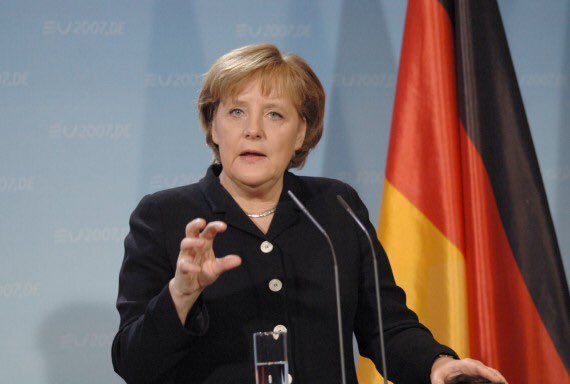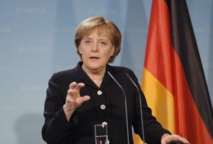Berlin – German Chancellor Angela Merkel ended the first round of talks to form a new coalition government on a positive note Wednesday but party officials warned that that they faced an uphill battle to forge the first national three-way alliance.
"If parties that are so different (...) try to work together, then that is also a strong signal when it comes to overcoming divisions in our society," said Peter Tauber, the general secretary of Merkel's Christian Democrats (CDU).
He was speaking after Merkel presided over preliminary talks between the CDU, its Bavarian-based Christian Social Union (CSU) allies, the pro-business Free Democrats (FDP) and the Greens.
However, the leaders of the other parties stressed that it was still early days in the talks to build a new coalition to rule Europe's biggest economy.
"That was a good conversation, a constructive conversation" said Green Party official Michael Kellner echoing remarks by his FDP and CSU counterparts following the talks.
But like CSU general secretary Andreas Scheuer, Kellner also stressed that the parties were still a long way from overcoming their differences.
The Merkel-led exploratory talks between the CDU-CSU, FDP and the Greens came amid signs that her grip on power has been weakened following last month's national elections and her party's poor showing in a state election at the weekend.
Wednesday's resignation of a long-standing CDU state premier and Merkel ally underlined the upheaval in the party unleashed by the September 24 election when the conservatives' vote sank to its lowest level since 1949.
Stanislaw Tillich plans to step down from the premiership of the eastern German state of Saxony in December after the right-wing populist Alternative for Germany (AfD) took the largest share of the vote in the state in the national election.
Merkel's arch-conservative critics in the CDU-CSU have also called for a shift to the right following Sunday's election success in Austria for conservative party leader Sebastian Kurz, who had taken a hard anti-immigration line in the campaign.
Merkel has admitted that the moves to forge a new coalition will not be easy. Most analysts have ruled out a government being formed before the end of the year.
Merkel's current coalition partner, the centre-left Social Democrats (SPD), indicated that in the event that the three-way talks collapse, they would prefer fresh elections rather than joining the chancellor in a new alliance.
"We are not available as a fallback option or as a reserve for the CDU," said SPD parliamentary leader Carsten Schneider.
The chancellor headed a delegation of 10 representatives from her CDU-CSU bloc in the first round of talks with the FDP and at the separate meeting with the Green Party.
The FDP and the Greens are scheduled to meet on Thursday. All three political groups are then scheduled to hold a joint meeting on Friday.
If the exploratory talks are successful, then the parties will move into formal coalition negotiations.
There are a slew of issues dividing the parties from coal as a source of energy, to the future of Europe, to taxation and the number of refugees allowed to enter the country.
The three parties will have to try to smooth over their differences before addressing the equally thorny question of the distribution of ministerial posts in the new government.
A battle has already emerged between Merkel's political bloc and the FDP over the finance ministry, with FDP chief Christian Linder insisting that the key portfolio should not remain in CDU hands.
He was speaking after Merkel presided over preliminary talks between the CDU, its Bavarian-based Christian Social Union (CSU) allies, the pro-business Free Democrats (FDP) and the Greens.
However, the leaders of the other parties stressed that it was still early days in the talks to build a new coalition to rule Europe's biggest economy.
"That was a good conversation, a constructive conversation" said Green Party official Michael Kellner echoing remarks by his FDP and CSU counterparts following the talks.
But like CSU general secretary Andreas Scheuer, Kellner also stressed that the parties were still a long way from overcoming their differences.
The Merkel-led exploratory talks between the CDU-CSU, FDP and the Greens came amid signs that her grip on power has been weakened following last month's national elections and her party's poor showing in a state election at the weekend.
Wednesday's resignation of a long-standing CDU state premier and Merkel ally underlined the upheaval in the party unleashed by the September 24 election when the conservatives' vote sank to its lowest level since 1949.
Stanislaw Tillich plans to step down from the premiership of the eastern German state of Saxony in December after the right-wing populist Alternative for Germany (AfD) took the largest share of the vote in the state in the national election.
Merkel's arch-conservative critics in the CDU-CSU have also called for a shift to the right following Sunday's election success in Austria for conservative party leader Sebastian Kurz, who had taken a hard anti-immigration line in the campaign.
Merkel has admitted that the moves to forge a new coalition will not be easy. Most analysts have ruled out a government being formed before the end of the year.
Merkel's current coalition partner, the centre-left Social Democrats (SPD), indicated that in the event that the three-way talks collapse, they would prefer fresh elections rather than joining the chancellor in a new alliance.
"We are not available as a fallback option or as a reserve for the CDU," said SPD parliamentary leader Carsten Schneider.
The chancellor headed a delegation of 10 representatives from her CDU-CSU bloc in the first round of talks with the FDP and at the separate meeting with the Green Party.
The FDP and the Greens are scheduled to meet on Thursday. All three political groups are then scheduled to hold a joint meeting on Friday.
If the exploratory talks are successful, then the parties will move into formal coalition negotiations.
There are a slew of issues dividing the parties from coal as a source of energy, to the future of Europe, to taxation and the number of refugees allowed to enter the country.
The three parties will have to try to smooth over their differences before addressing the equally thorny question of the distribution of ministerial posts in the new government.
A battle has already emerged between Merkel's political bloc and the FDP over the finance ministry, with FDP chief Christian Linder insisting that the key portfolio should not remain in CDU hands.









 Home
Home Politics
Politics











